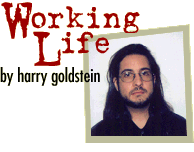Tripod Home | New | TriTeca | Work/Money | Politics/Community | Living/Travel | Planet T | Daily Scoop
|
WORK & MONEY
WHEN
THE
EXTRA
MILE
IS
A
BRIDGE
TOO
FAR
Published June 10, 1996
Previous columns
|
I apologize in advance for mixing metaphors and spewing cliches, but I'm all twisted up inside with righteous anger. Anger at myself, mostly, for playing the passive-aggressive lame-ass with my boss. For not drawing that line in the sand. For letting all the little things she's asking me to do build up like some poisonous mildew that's sure to choke the life out of me at any second. Worst of all, I've lost my sense of humor. I know where she's coming from. A.C.M.E. is relocating in a few months and she knows that her employees are:
Her solution to the situation is micromanagement: Literally hanging over my shoulder as I edit a piece, or waiting just outside my cubicle for me to finish a phone call, or personally delivering absolutely useless faxes as an excuse to see what I'm up to.
|

|
I'm not insulted; I'm incensed. If I had known from the beginning that I'd have to put in the kind of time she is now expecting, I'd have
asked for more money before taking the gig. Now I just mumble in apparent acquiescence and think about where I need to send my resume. Instead of making me want to stay until
the company moves, she's pushing me out. There is no mention of a stay bonus, a raise or even a title change -- just more work.
This is precisely the time for a manager to assess the needs of her employees and to try to meet them halfway. She's the one stuck between the rock and the hard place, not me. I can get another job, but if I (or any of my colleagues) go, there's no money allocated to hire a replacement until A.C.M.E. completes its relocation. A heavier workload for everyone who remains is a certainty that will result in a domino effect. Once one editor goes, the rest of us are going to jump ship as soon as we can. There is an anti-incentive to stay. This is what it's like to be part of a company's transitional period. There has been an epidemic of this "downsizing" in the last few years; thousands of employees and careers have been sacrificed to the bottom line.
|

|
I've seen it myself at other offices: The endless train of late afternoon goodbye parties greased along by beer and cake and uncomfortable speeches,
awkward hugs and "good luck" back-slapping farewells. Walking by the
empty offices in the middle of the afternoon and flashing on those chance encounters with
co-workers who you'll never see again. Worst of all is knowing that the company you work for goes on without them -- and will go on without you. Everyone is expendable.
We all come up with different ways of dealing with this emotionally oppressive situation. Humor is one of the most common; if you're fortunate, you and your colleagues will wile away the final days sniping at management and making bad jokes about the town where the company is relocating. Unfortunately, A.C.M.E. is moving to Reston, Va., where the ebola virus wiped about 400 monkeys at a research facility a few years ago. We still haven't come up with a good ebola relocation joke. This means that management bears the brunt of our gallows humor, usually in the form of sexual innuendo that induces heebee-geebees -- sort of like the feeling you get when you try to imagine your parents having sex.
|

|
Now the jokes are wearing thin and humor is giving way to bilious rancor. Certain of my colleagues have begun taking unpaid sick days, figuring that their mental health is worth whatever lost wages they incur. Little things about my co-workers that struck me as strange three weeks ago annoy the hell out of me today. I snap at people. I glare at intruders to my cubicle long after
they've gone on their way. Some of my colleagues sulk, slumped at their
desks, staring out the window, perking up only when the phone rings or the
computer beeps, announcing an incoming e-mail.
Anyone strolling past our cubicles can tell the end is nigh; anyone, that is, except my boss, who insists on fluttering into our offices like a mother hen, pecking at us to put forth that extra effort "we're all capable of." I almost feel like I should take her aside and explain the situation to her, try to make these last few weeks and months easier on all of us -- and if all else fails, strangle her. Then the phone rings. Or I think of the next place to send my resume. Or an e-mail comes through, a colleague commiserating. The battle lines have been drawn; I can see who I'm going to soldier through this transition with and who's going to be in my way as I stumble out the door.
Harry Goldstein is a writer and editor living in Manhattan. His work has appeared in Utne Reader, American Book Review, Promethean, AltX, word.com, and other periodicals.
© 1996 Harry Goldstein, All Rights Reserved
|
Map | Search | Help | Send Us Comments

